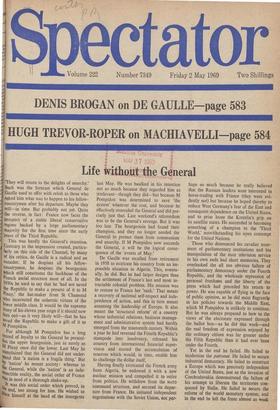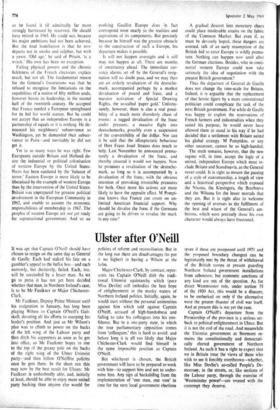t\1/\Y)7
Life without the General
'They will return to the delights of anarchy.'
- Such was the forecast which General de :IL Gaulle used to offer with relish to those who ' asked him what was to happen to his fellow- countrymen after his departure. Maybe they will—in time. But probably not yet. Quite the reverse, in fact: France now faces the Prospect of a stable liberal conservative regime backed by a large parliamentary majority for the first time since the early Years of the Third Republic.
This was hardly the General's intention. Contrary to tha impression created, particu- larly on this side of the Channel, by many of his critics, de Gaulle is a radical and an outsider. If he despises all his fellow- countrymen, he despises the bourgeoisie Which still constitutes the backbone of the French social structure most of all. In the 1950s he used to say that he 'had not saved the Republic to make a present of it to M Pinay,' the hat-maker from St Chamond Who incarnated the unheroic virtues of the lower middle class. It would be the supreme irony of his eleven year reign if it should now turn out—as it very likely will—that he has saved the Republic to make a gift of it to IA Pompidou. .
For although M Pompidou has a long record of loyalty to the General he personi- fies the upper bourgeoisie, just as surely as _ Pinay once did the lower. Last May he Complained that the General did not under- !rand that 'a nation is a frggile thing.' But °Y 'nation' he meant society: whereas to the General, while the 'nation' is an inde- structible reality, the social order of France was in need of a thorough shake-up. It was this social order which proved, in the end, too strong for him. He wished to Place himself at the head of the insurgents last May. He was baulked in his intention not so much because they regarded him as irrelevant—though they did—but because M Pompidou was determined to save 'the system' whatever the cost, and because be effectively overruled the General and did pre- cisely just that. Last weekend's referendum was to be the General's revenge. But it was too late. The bourgeoisie had found their champion, ,and they no longer needed the General to protect them from communism and anarchy. If M Pompidou now succeeds the General, it will be the logical conse- quence of the 'events of May.'
De Gaulle was recalled from retirement in 1958 to extricate his country from an im- possible situation in Algeria. This, eventu- ally, he did. But he had larger designs than the settlement of France's last and most in- tractable colonial problem. His mission was to restore to France her 'rank.' That meant a recovery of national self-respect and inde- pendence of action, and this in turn meant assuming the leadership of Europe. It also meant the 'structural reform' of a country whose industrial relations, business manage- ment and administrative system had hardly emerged from the nineteenth century. Within a year he had reversed the Fourth Republic's stampede into insolvency, released his country from international financial super- vision and started the accumulation of reserves which would, in time, enable him to challenge the dollar itself.
Having finally extricated the French army from Algeria, he endowed it with a new nuclear mission and compelled it to retire from politics. He withdrew from the NATO command structure, and secured its depar- ture from France. He initiated independent negotiations with the Soviet Union, not per- haps so much because be really believed that the Russian leaders were interested in horse-trading with France (they were evi- dently not) but because he hoped thereby to reduce West Germany's fear of the East and consequent dependence on the United States, and to prise loose the Kremlin's grip on its satellite states. He succeeded in becoming something of a champion to the 'Third World,' notwithstanding his open contempt for the United Nations.
Those who denounced his cavalier treat- ment of parliamentary institutions and his manipulation of the state television service to his own ends had short memories. They overlooked the all too obvious failure of parliamentary democracy under the Fourth Republic, and the wholesale repression of personal freedoms and the liberty of the press which had preceded his return to power. He was capable of flying in the face of public opinion, as he did most flagrantly in his policies towards the Middle East, which M Pompidou is unlikely to continue. But he was always prepared to bow to the views of the electorate expressed through the ballot box—as he did this week—and the real freedom of expression enjoyed by the ordinary citizen was far greater under the Fifth Republic than it had ever been under the Fourth. as he found it (if admittedly far more strongly buttressed by reserves). He should have retired in 1965. He could not, because his major ambitions had not been achieved. But the final humiliation is that he now departs not in smoke and sulphur, but with a yawn. 'Old age,' he said of Main, 'is a wreck.' His own has been no exception.
Failing physical powers and the chronic fickleness of the French electorate explain much, but not all. The fundamental reason for the General's frustrations was that he refused to recognise the limitations on the capabilities of a nation of fifty million souls. however heroic its leadership, in the second half of the twentieth century. He accepted that France needed a European springboard for its bid for world stature. But he could not accept that an independent Europe is a partnership of equals or it is nothing. He de- nounced his neighbours' subservience to Washington, yet he demanded their subser- vience to Paris—and inevitably he did not get it.
Yet in so many ways he was right. Few Europeans outside Britain and Holland de- sire the industrial or political colonisation of western Europe by the United States. NATO has been outdated by the 'balance of terror.' Eastern Europe is more likely to be liberalised by the example of western Europe than by the intervention of the United States. Britain was unprepared for genuine political involvement in the European Community in 1962, and unable to assume the economic responsibilities of membership in 1967. The peoples of western Europe are not yet ready for supranational government. And so an evolving Gaullist Europe does in fact correspond most nearly to the realities and aspirations of its components. But precisely because he himself was the greatest obstacle to the construction of such a Europe, his departure makes it possible.
It will not happen overnight and it still may not happen at all. There are months of uncertainty ahead. The immediate cur- rency alarms set off by the General's resig- nation will no doubt pass, and we may then see an orderly revaluation of the deutsche- mark, accompanied perhaps by a modest devaluation of pound and franc, and a massive activation of Special Drawing Rights, the so-called 'paper gold.' Unfortu- nately, however, there is also a real possi- bility of a much more disorderly chain of events: a ragged devaluation of the franc under pressure, a massive flight into deutschemarks, possibly even a suspension of the convertibility of the dollar. Nor can it be said that the idiosyncratic behaviour of Herr Franz Josef Strauss does much to help. Last November he announced prema- turely a devaluation of the franc, and thereby ensured it would not happen. Now he promises a revaluation of the deutsche- mark, so long as it is accompanied by a devaluation of the franc, with the obvious intention of provoking irresistible pressures for both. Once more his actions are more likely to have the opposite effect. M Pompi- dou knows that France can count on un- limited American financial support. Why should he devalue the franc if the Germans are going to be driven to revalue the mark in any case? A gradual descent into monetary chaos could place intolerable strains on the fabric of the Common Market. But even if, as must be devoutly hoped, these dangers are averted, talk of an early resumption of the British bid to enter Europe is wildly prema- ture. Nothing can happen now until after the German elections. Besides, who in conti- nental western Europe could now take seriously the idea of negotiation with the present British government?
Thus the departure of General de Gaulle does not change the time-scale for Britain. Indeed, it is arguable that the replacement of that heroic figure by a more conventional politician could complicate the task of the next British government. For while de Gaulle was happy to exploit the reservations of French farmers and industrialists when they suited his purpose, he would never have allowed them to stand in his way if he had decided that a settlement with Britain suited his global strategy. M Pompidou, or any other successor, cannot be so high-handed.
The truth remains, however, that the new regime will, in time, accept the logic of a united, independent Europe which must in- clude Britain and Scandinavia, as the General never could. It is right to mourn the passing of a style of statesmanship, a length of view and a historical perspective which exposed the Nixons, the Kiesingers. the Brezhnevs and the Wilsons for the lesser mortals that they are. But it is right also to welcome the opening of avenues 'to the fulfilment of the best and wisest of the General's am- bitions, which were precisely those his own character would always have frustrated.



































